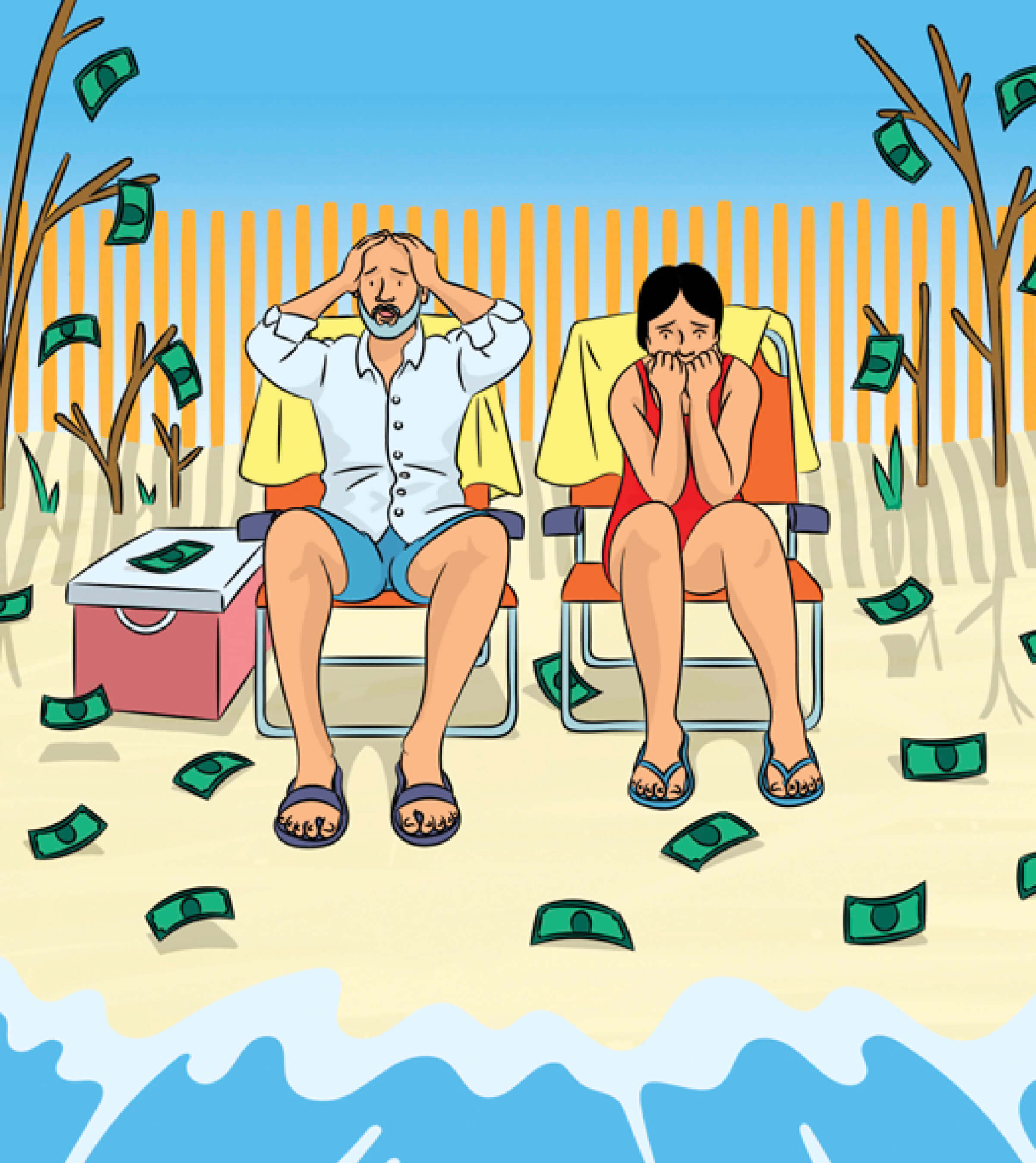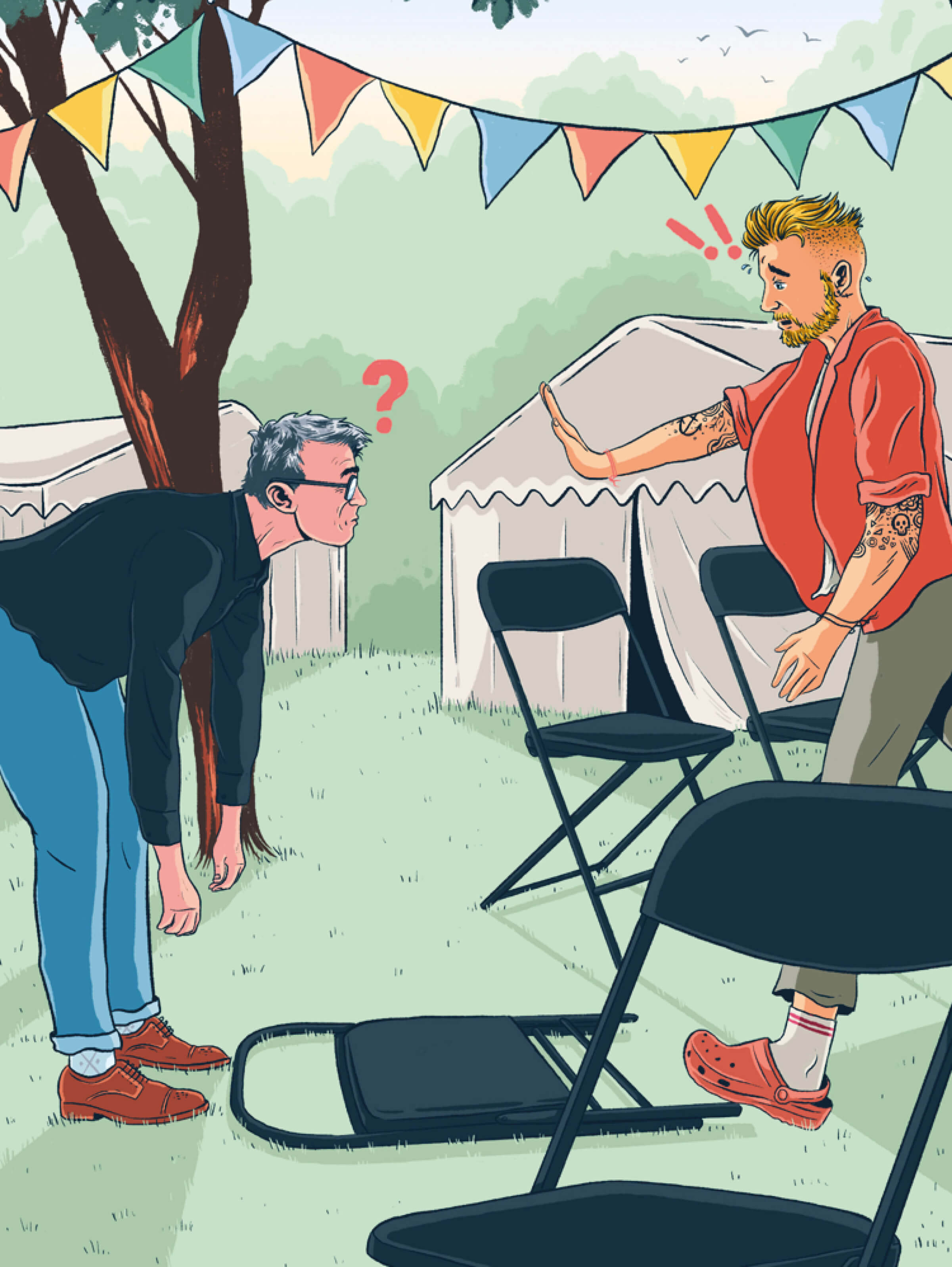THIS IS 50
The Great Retirement Freak-Out
Why Gen Xers worry about their financial future—and what you can do to assure yours

FOR YEARS, Mike Cundall Jr. thought he was on the proper path to retirement. A professor of philosophy at North Carolina A&T University, Cundall, 49, and his wife, Amy Werner, 48, a fundraiser at High Point University, did everything right. Since they entered the workforce, they have put money from every paycheck into 401(k) plans and Roth IRAs.
But now Cundall is beginning to wonder whether the couple’s savings will ever be enough.
One reason for the Greensboro, North Carolina, resident’s anxiety: the unpredictability of the stock market. Then there’s inflation and rising health care costs. Financial advisers have counseled the couple to save more, but the costs of raising their three children—now 22, 20 and 14—have made that impossible, Cundall says.
“All this has led me to believe that no matter how much we’ve saved, we’re not going to be able to retire and simply enjoy the golden years.”
Cundall’s pessimism is widely shared among his peers in Generation X—or “Generation anXious,” as a recent Northwestern Mutual study dubbed them. According to the study, Gen Xers are considerably more likely than boomers to predict that they will outlive their savings.
“The anxiety is real, and I think it’s probably somewhat well placed,” says Brian Ream, 53, principal at accounting and wealth advisory firm CliftonLarsonAllen in New Bedford, Massachusetts. In many respects, “Gen X is woefully unprepared for the traditional sense of retirement.”
A confluence of pressures
To some degree, their anxiety has a straightforward explanation: Gen Xers now range in age from 43 to 58, so retirement is becoming more real to them. But many reasons for their jitters stem from unique economic challenges.
Compared to their predecessors, Gen Xers tended to marry and have families later, says Ream. That turned them into a sandwich generation, with many caring for aging parents while still raising their kids, which could mean a need to step away from paid work during what are traditionally peak saving years.
In addition, Gen X has seen the costs of housing, health care and tuition outpace inflation for years. Meanwhile, wage growth has been stagnant for all but the wealthiest Americans. As a result, says Thomas Jensen, a Portland, Oregon–based wealth management adviser with Northwestern Mutual, many don’t “have the luxury to say, ‘I’m going to put money aside for retirement.’ ”
And Gen Xers are under more pressure than their parents to try to sock money away. Their early careers coincided with an epochal shift in how workers’ retirements are funded. “They no longer have the ability to rely, as previous generations did, on traditional pensions,” says Dylan Tyson, president of Prudential Retirement Strategies. Only 20 percent of Gen Xers expect to receive a pension in retirement, according to a Prudential survey.
Concerns about Social Security compound Xers’ anxiety. Just 45 percent believe Social Security will be there when they need it, the Northwestern Mutual study found, compared with 55 percent of the general adult population.
And while Social Security is not in danger of running out of money as long as the government keeps collecting payroll taxes, retirement benefits could be reduced if Congress does not shore up the program’s finances.
A new vision of retirement
Add it all up, and you get a generation that needs different financial strategies than their parents used. For example, their parents may have been willing to pay all of their college costs. Gen Xers might need to rethink doing that for their own kids, Ream says.
Tyson advises Gen Xers to think in terms of their future monthly income. Some of his recommendations: Keep tabs on what you can expect to get from Social Security, retirement account withdrawals and any other income sources. Will that cover your basic needs? Finding ways to cut spending now may put you in a better position to enjoy life later, he says.
Many Gen Xers are also coming to realize that retirement may not necessarily mean leaving work behind. Forty percent anticipate working part-time in retirement, the Prudential survey found.
Cundall expects to be one of them. The author of the 2022 book The Humor Hack: Using Humor to Feel Better, Increase Resilience, and (Yes) Enjoy Your Work hopes his “retirement” years will include consulting on how to use humor to lead a richer life.
Ream believes that many members of Gen X will find ways to bring in income through entrepreneurship or part-time work they truly enjoy.
“All of these societal changes have been kind of thrust upon us,” says Ream. “It’s up to us now to say we’re going to take control. Don’t let the tide take you out. It’s just time to maybe swim a little harder.” —Tamara E. Holmes
Staying Afloat
Debt weighs down retirement savers


$86,994
AVERAGE TOTAL DEBT FOR AMERICANS AGES 50–59
SOURCE: BUSINESS INSIDER ANALYSIS OF FEDERAL RESERVE STATISTICS


$100,000
MEDIAN RETIREMENT ACCOUNT ASSETS FOR AMERICANS AGES 45–54
$134,000
MEDIAN RETIREMENT ACCOUNT ASSETS FOR AMERICANS AGES 55–64
SOURCE: FEDERAL RESERVE (2019 DATA)
GET NICER NAILS
Are your hands crying out for help? Nails may grow thin and brittle after 50

FOR SOME TLC, consider a strengthening treatment to massage over nails. Seek ingredients like keratin and calcium (to harden) or jojoba oil and glycerin (to hydrate).
If you use polish, try a top coat with built-in strengthening ingredients. Such products provide a glossy finish to make up for lost luster. But avoid ones with formaldehyde.
You may also want to ditch press-on nails, acrylics and acetone polish removers. Any damage they cause will take longer to grow out than it used to. —Anissa Gabbara
WINTERIZE YOUR HEART
IS YOUR TICKER READY for cold weather? Heart attack deaths spike in late December. We asked two experts—Deepak Bhatt, M.D., director of Mount Sinai Heart, and Bethany Doran, M.D., a board-certified cardiologist—for tips on staying heart-healthy this winter. —Eric Spitznagel

SKIP!
Booze
Even small quantities of alcohol increase your risk for abnormal heart rhythm, or A-fib, says Bhatt. So if you must have that eggnog or festive cranberry martini, stick to one and done.

SKIP!
Hot showers
Extremes in temperature can stress your heart. “Blood vessels may vasodilate, and your heart has to work harder to keep up,” says Doran. A steaming-hot shower can feel like a treat, but opt for lukewarm instead.

PICK!
Outdoor exercise
Bundle up and go explore nature. Norwegians, who call the practice friluftsliv, say it de-stresses them. Studies agree.

SKIP!
Holiday spats
Your blood pressure already spikes during winter, but fighting with family makes you 8.5 times more likely to have a heart attack up to two hours later, one study showed.

PICK!
Sad songs
Melancholy music—“Christmas Time Is Here” from A Charlie Brown Christmas, for instance—can actually boost your mood. But Bhatt says any music you enjoy can have the same stress-reducing effect.

PICK!
Flu shot
Having the flu raises your risk of heart attack by a factor of six. But a flu shot lowers your cardiovascular risk by a third all year, not just during flu season.
SKIP!
Going solo
Being socially isolated or lonely increases your risk of heart attack or stroke by about 30 percent. Don’t say no to a night out with friends, even if home seems cozier.

PICK!
A screwball comedy
“Laughter is great for heart health,” says Doran. Cue up your favorite Adam Sandler or Mel Brooks movie and make your heart smile.

PICK!
Sex
Having sex at least twice a week greatly reduces your risk of a winter heart attack, according to studies. We’re just saying.
ADULTING


MAYBE YOUR FOLKS value their privacy, but in a health crisis, you’ll be much better able to help them if you already have some basic information. We asked Aaron Blight, author of When Caregiving Calls: Guidance as You Care for a Parent, Spouse, or Aging Relative, which questions to ask—and the best ways to ask them.
1 If you need help with daily tasks, where will you live?
They may expect to move in with a family member, go to an assisted living facility or have an aide at home.
2 How do you expect any future care to be paid for?
Get a sense of their finances and whether they want you to have access, now or later.
3 Where are your estate-planning documents?
If they don’t have a will, powers of attorney and an advance directive, encourage them to make these.
4 Do you have any unfinished business?
This could relate to financial, personal or other matters.
5 What matters most to you right now?
“This question can be very profound,” says Blight. “It’s about understanding your parents’ current and future wishes.” —Leslie Quander Wooldridge
TAMRON HALL AFTER 50
“I love giving advice now. My nephew is 27, and he just visited with his girlfriend. I loved talking with them about my 20s—not that I want them back or regret anything. My 20s happened, and they helped form my 50s. I love that.” —As told to Gayle Jo Carter

Tamron Hall, 53, is the host of her own syndicated talk show and coauthor of the mystery novel As the Wicked Watch. Our full interview, available to AARP members only, is at aarp.org/quickquestions.
SEASON’S BEATINGS
Oh, what parents went through to get Cabbage Patch dolls

THIS CHRISTMAS SEASON marks the 40th anniversary of the Cabbage Patch riots, when the chunky-cheeked dolls stirred yuletide insanity among shoppers.
The appeal: No two Cabbage Patch Kids were alike, and each came with a birth certificate and adoption papers.
The problem: Supply and demand. When the doughy dolls became scarce, desperate shoppers took desperate measures—including (sorry, Santa) turning violent.
The low point: In New Jersey, a crowd trampled a pregnant woman (she and her unborn baby were not injured).
Current value: Mint-condition Cabbage Patch Kids, originally about $20, sell for $50 and up on eBay. —Ken Budd
MY FIRST TIME...
HEARING THAT SOMETHING’S TOO HEAVY FOR ME

I’M A BOARD member for a local book festival, and before a recent meeting, a 20-something staffer at a community center was carrying folding chairs to our table. I offered to help, and panic gripped his face. “Oh no, sir—that’s OK,” he said.
He wasn’t just being polite. I could see the wary concern in his stare, could sense his leap from eyeing my salt-and-pepper hair to thinking, I do not want this geezer lifting chairs and having a heart attack.
Offensive, right? I mean, sure, I’d had a heart attack about three months earlier, but he didn’t know that! Besides, I was 6 inches taller and much broader-shouldered than my nervous Gen Z protector. I may not be Lou Ferrigno (to use a reference he probably wouldn’t know), but I’d certainly be the victor in a chair-carrying contest.
Rather than feel insulted, however, I’m using it as incentive. After my heart attack—a mild one—I attended cardiac rehab sessions, and I continue exercising at a gym. Protecting my ticker is my main motivation, but sometimes, when I’m sweating on a treadmill, I think of that young staffer. Next time, I won’t ask if he needs help. I’ll just flex my 57-year-old muscles and start lugging chairs—the sight of which might give him a heart attack. —K.B.
MEMBER CHECK LIST

SIGN UP FOR MEMBERSHIP AUTO-RENEWAL
You’ll save 25 percent off your annual fee in the initial year; you’ll guarantee access to over 300 AARP member discounts and benefits; you’ll get less mail; and you’ll be helping to secure a better future for all older Americans. You can still cancel anytime, without fees. Go to aarp.org/enrollar to download.